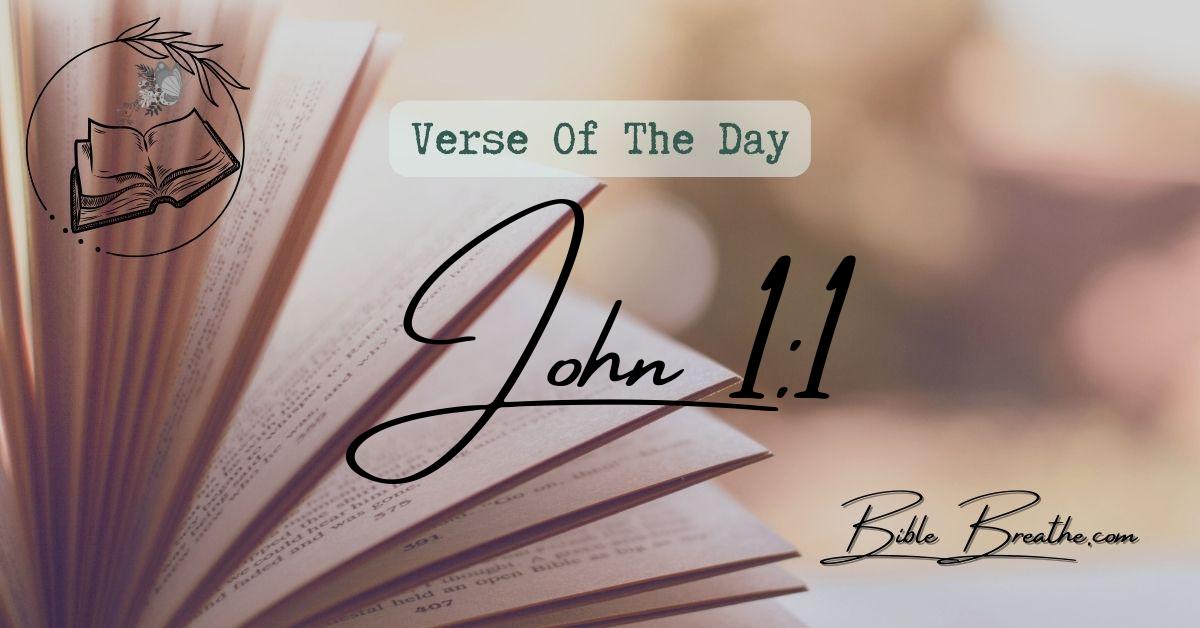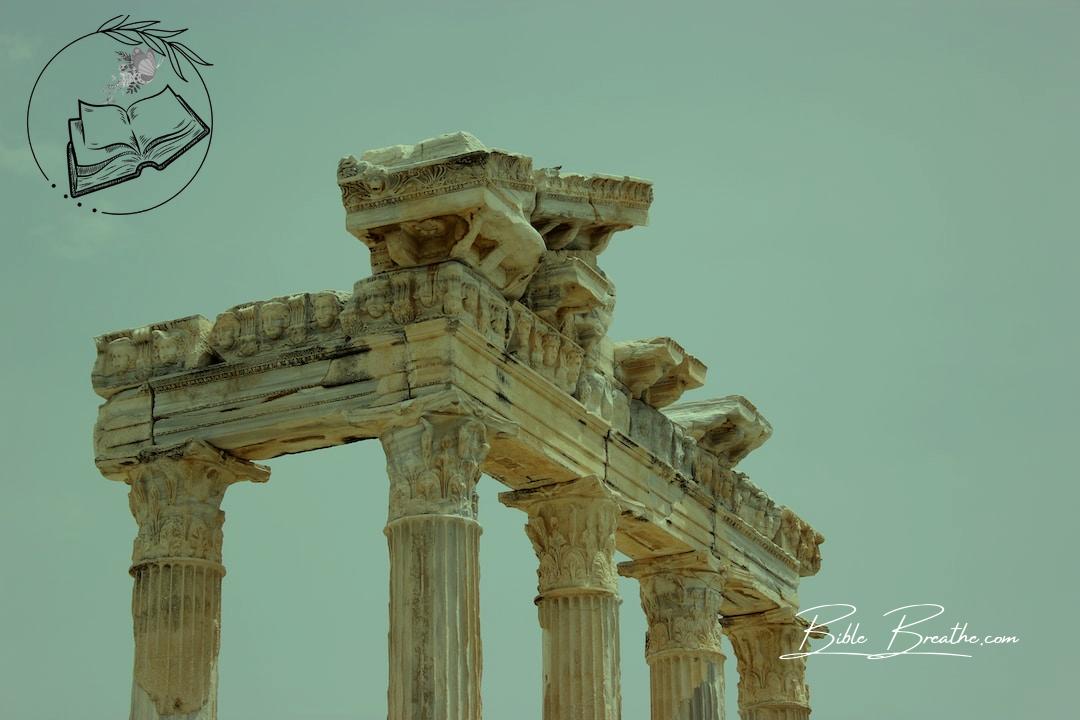John 1:1 kicks off John’s Gospel like fireworks on a starry night, revealing a mind-blowing truth!
Picture this: it’s like the opening scene of an epic movie, but instead of dragons or superheroes, it’s about Jesus—the main character from the get-go.
Check it out: “In the beginning, there was the Word.” Hold up!
What’s the ‘Word’?
Think of it as the blueprint, the ultimate game plan, hanging out with God from the jump, and guess what?
The ‘Word’ wasn’t just chilling; it was God—it was divine!
Now, here’s the crazy part—this ‘Word,’ aka Jesus, was around even before Earth’s playlist started.
It’s like Jesus pressing play on the whole creation mixtape.
He’s the OG Light bringing the party to a dark world.
John 1:1 isn’t your typical intro; it’s like the key unlocking a treasure chest of mind-blowing truths!
It’s about Jesus being there from the very beginning, fully God, and getting ready to rock our world.
So, join the journey as we dive into this verse, uncovering Jesus as the Word-turned-human and the cosmic rockstar who lights up everything!
“In the beginning was the Word, and the Word was with God, and the Word was God.” – John 1:1 (KJV)
Key Takeaways
- John 1:1, “In the beginning was the Word, and the Word was with God, and the Word was God,” speaks of the Divine Logos or Word as being eternally existent and essentially divine, emphasizing Christ’s preexistence before all creation.
- This verse doesn’t just introduce Jesus but showcases Him as the central Light of Creation, intricately woven into the fabric of the universe from its very inception.
- In a world filled with diverse voices and opinions, John 1:1 challenges us to recognize the weight and authority of God’s Word, reminding us that truth isn’t relative but is rooted in the eternal Word.
- For believers navigating the complexities of the modern era, this verse instills a sense of purpose and identity, asserting that just as the Word was essential at the beginning, it remains vital in shaping our daily narratives.
- Embracing the essence of John 1:1 means prioritizing spiritual enlightenment and guidance from the Word, fostering a deeper connection with God, and drawing strength from the timeless truth that has been, is, and always will be.
John 1:1: Unveiling the Eternal Word
Dive deep with me into the opening verses of the Gospel of John, where the essence of the Word becomes tangible, a truth that resonates through the corridors of biblical wisdom.
Verse of the Day:
“In the beginning was the Word, and the Word was with God, and the Word was God.” – John 1:1, KJV
Basic facts of the verse:
| **Attribute** | **Value** |
|---|---|
| Book | Gospel of John |
| Chapter | 1 |
| Verse | 1 |
| Christian Bible part | New Testament |
| KEYWORDs | Word, God, beginning, Light |
| Topics | Creation, Divine Essence |
| Bible Themes | Eternal Word, Christ’s Preexistence |
| People | God |
| Location | The Beginning (contextual) |
In the genesis of all things, the Word stood, a divine beacon illuminating the path of creation.
Let this truth guide your reflections today.
Word became flesh, Divine Logos resonating, Beginning with God; ponder on these profound revelations as you traverse the sacred text.
John 1:1 KJV Cross References
These are some Bible verses related to John 1:1:
| **Cross Reference Verse (KJV)** | **Verse** |
|---|---|
| Genesis 1:1 | In the beginning, God created… |
| Colossians 1:17 | He is before all things, and in him all things hold together. |
| Proverbs 8:22-23 | The Lord possessed me at the beginning of his work… |
| 1 John 1:1 | That which was from the beginning, which we have heard… |
| Revelation 19:13 | He is clothed in a robe dipped in blood, and the name by which he is called is The Word of God. |
| John 1:14 | And the Word became flesh and dwelt among us… |
| John 17:5 | And now, Father, glorify me in your own presence with the glory that I had with you before the world existed. |
| Hebrews 1:1-2 | Long ago, at many times and in many ways, God spoke to our fathers by the prophets, but in these last days, he has spoken to us by his Son… |
| John 8:58 | Jesus said to them, “Truly, truly, I say to you, before Abraham was, I am. |
John 1:1: The Timeless Echo of Divine Beginnings
Photo modified by BibleBreathe.com. Original photo by micheile henderson on Unsplash
John 1:1 declares, “In the beginning was the Word, and the Word was with God, and the Word was God.” This is a powerhouse verse, folks.
But to truly unpack its depths, we’ve got to journey back in time, and see its beauty through ancient eyes.
Historical and Cultural Context
Imagine the rich tapestry of the ancient Near East—where philosophies flourished and gods were a dime a dozen.
In this backdrop, John introduces Jesus not just as another prophet but as the Divine Logos.
The term ‘Logos’, borrowed from Greek philosophy, was already familiar.
But John?
He flipped the script.
What do I mean?
The Greeks saw Logos as an impersonal force, a cosmic reason governing the universe.
But John tells us, this Logos, this Word became flesh.
Imagine the ripple effect of such a revelation!
It was like telling a tech-savvy generation that the most advanced AI has emotions.
Mind-blowing, right?
Moreover, in a culture brimming with creation myths, John asserts Jesus as the Light of Creation.
He wasn’t just another god in the pantheon.
No, He was there “in the beginning with God.” This underscores Christ’s preexistence and establishes His divinity in a way that resonated with both Jews and Gentiles.
So, why does this matter? Well, back then, society was in a swirl of beliefs.
And John’s assertion?
It was revolutionary.
He was saying: In the maze of divinities you chase, here’s the real deal.
The One who was, is, and forever will be.
As we grasp John 1:1 today, it’s not just an introduction to Christ.
It’s an anchor.
An anchor that reminds us, in the flux of life’s ideologies, there’s an unchanging truth: that in the beginning and till the end, Christ remains central.
Can I get an amen?
John 1:1: Unraveling the Profound Truth of the Word
You know, life is a lot like a puzzle.
Each piece has its place, and when they all come together, a magnificent picture emerges.
John 1:1, my friends, is a central piece in understanding the divine puzzle of Jesus’ identity.
So, let’s dissect this piece for a clearer picture.
Verse Analysis and Literal Interpretation
- “In the beginning”
- Significance: Echoing Genesis 1:1, it transports us back to the dawn of creation.
- Original Language Insight: This phrase (Ἐν ἀρχῇ) underlines a timelessness, the very outset of time and space.
- “was the Word”
- Significance: Before anything was, the Word became flesh and was present.
- Original Language Insight: The “Word” (Λόγος or “Logos”) in Greek philosophy represents reason or principle. For John, it’s the Divine Logos—Jesus.
- “and the Word was with God”
- Significance: The Word, while distinct, was in intimate fellowship with God—pointing to Christ’s preexistence.
- Original Language Insight: The term “with” (πρὸς) signifies a face-to-face relationship, emphasizing closeness.
- “and the Word was God.”
- Significance: The Word wasn’t just divine-like; He was and is fully God.
- Original Language Insight: By stating “was God” (θεὸς ἦν), John affirms the deity of the Word.
John’s Gospel, beautifully weaved, reveals Jesus as the Light of Creation, the life-source of humanity.
John 1:1 sets the stage, anchoring Jesus’ identity in the vast expanse of eternity.
As you fit this piece into your life’s puzzle, ask yourself: How does recognizing Jesus as the Word change the way you approach His teachings?
If the Word was there in the beginning with God, how profound are the words He spoke on earth?
Dive deep, and let this truth resonate in your heart.
John 1:1: A Glimpse into the Timeless Divine
Picture this: Before there was time, before the universe hummed into existence, there was the Word.
This profound introduction in John 1:1 isn’t just a cornerstone of Christian beliefs but resonates with the essence of many religious texts.
Yet, like a rare gem, it has its own unique facets that set it apart.
Similarities with other religious texts
- Divine Origin: The concept of the Divine Logos or the primal force isn’t limited to Christianity. The Hindu scripture, Rigveda, mentions “In the beginning was Brahman, with whom was the Word.”
- Preexistence: The Buddhist doctrine highlights the eternal nature of Buddha-nature, akin to the theme of Christ’s preexistence in John 1:1.
- Light Metaphor: The Light of Creation is a universal theme. Zoroastrianism reveres Ahura Mazda as the supreme light, echoing the sentiment of the Word being the light in Christian teachings.
Differences with other religious texts
- The Word Became Flesh: The idea that the Word became flesh in Jesus is uniquely Christian. This profound incarnation is unparalleled in its intimacy and depth in other religious texts.
- Distinct Relationship with God: John 1:1 posits, “The Word was God.” This intimate, yet distinct relationship between the Word and God is a standout feature in the Christian narrative.
- Christ-centered Creation: While many religions posit a divine force at the onset, John 1:1 unequivocally emphasizes that “All things were made through Him.”
Imagine you’re exploring a vast library.
As you peruse, you see recurring themes, stories that seem to echo across cultures.
But then you come across John 1:1, a familiar yet distinct narrative, emphasizing not just the existence of a Divine force at the beginning with God but its transformation into flesh for an intimate communion with humanity.
It begs the question: In the symphony of religious beliefs, what melody does your heart resonate with?
Breaking Down John 1:1: Interpretations & Its Resonance Today
John 1:1, “In the beginning was the Word, and the Word was with God, and the Word was God,” is profound, y’all.
It’s like the foundation of a skyscraper, shaping our understanding of who Christ is.
But isn’t it something how different lenses can paint diverse pictures?
Theological Implications and Modern Interpretations and Misinterpretations:
- Roman Catholicism: They’re locked in on the Divine Logos.
For them, this verse reveals Christ’s preexistence, highlighting that Jesus isn’t just a moment in time but has been with the Father since the very start.
- Eastern Orthodox: Delving deep into mysticism, they view John 1:1 as the revelation of the eternal Word becoming flesh.
Like the sun breaking dawn, it’s about the Light of Creation making His presence known.
- Protestantism: To them, it’s straightforward.
Christ is the eternal Word, coequal with God.
It’s a recognition of Jesus’ divinity and his intimate relationship with the Father from the beginning.
- Seventh-day Adventists: Emphasizing Christ as the Light of Creation, they see John 1:1 as confirmation of Jesus’ active role in the formation of the world.
- Mormonism: They perceive the Word as Christ, but with a twist.
They believe in a time when Jesus was not yet God.
It’s about progression, from intelligence to Godhood.
- Jehovah’s Witnesses: Now, here’s where things pivot.
They translate the verse as “the Word was a god”, suggesting that Jesus, while powerful, isn’t Almighty God but a created being.
Zooming out, John 1:1 isn’t just a standalone proclamation.
It sets the stage for the entire Gospel.
It’s the opening note in a divine symphony.
Ever thought about the power of a strong beginning?
Just like the opening scene of a blockbuster movie, this verse grabs our attention and sets the tone.
Contemporary Debates
And in this modern age, with voices louder than ever, John 1:1 isn’t exempt from debates.
Is it a poetic metaphor or literal truth?
Is it about Christ’s divinity or a nuanced understanding of His role?
Think about it: In our own lives, how often do we grapple with beginnings, identity, and purpose?
So, whether you’re diving deep into scriptures, or just pondering life’s big questions, John 1:1 invites you.
To explore, to question, to reflect.
Because understanding this verse is like unlocking a treasure chest, revealing the rich tapestry of Christ’s nature and His eternal dance with the Father.
And y’all, it’s a dance that invites us all.
Unpacking John 1:1: When Science Meets the Divine Logos
Photo modified by BibleBreathe.com. Original photo by Julia Koblitz on Unsplash
Imagine standing at the precipice of the universe, its vastness stretching infinitely.
As the cosmos unfurls, there’s a whisper – the Word became flesh.
John 1:1 presents a profound concept, but when juxtaposed with modern science, where does it stand?
Science thrives on evidence and observation, dissecting the cosmos to understand its mechanics.
From the Big Bang’s explosive onset to the intricate dance of subatomic particles, we’ve sought to unravel the universe’s mysteries.
But how does this empirical exploration sync with John’s declaration of the Divine Logos?
John speaks of Christ’s preexistence, the Word that was beginning with God, echoing through eternity.
It’s a statement of origin, yet science turns to the Big Bang as its genesis event.
But is there a meeting point?
Could the Big Bang, with its blinding brilliance, mirror the Light of Creation?
While science meticulously measures the universe, it doesn’t venture into realms of divine origin.
The Word became flesh is a spiritual concept, reaching beyond the physical realm.
It doesn’t contradict science but transcends it.
Consider DNA – a language that forms life.
Isn’t it a tangible reflection of the unseen Divine Logos?
In the dialogue between science and scripture, both hold value.
Science describes the universe’s mechanics while John 1:1 offers a deeper, spiritual narrative.
Instead of opposition, could they be two sides of the same cosmic coin?
Rhetorically, can the intangible essence of love, hope, or inspiration be solely defined by science?
Maybe John 1:1 is the echo of divine intent, reverberating in every cosmic law and life’s heartbeat.
As we navigate the crossroads of faith and fact, the challenge remains: Can we embrace both, seeing the Light of Creation in every scientific discovery and cherishing the profound mystery of the Divine Logos?
How will this harmony shape your journey?
John 1:1 and the Blueprint of Life: Navigating Our Journey With the Word
Have you ever watched a master architect, with blueprints in hand, turn a blank canvas into a mesmerizing masterpiece?
That’s the essence of John 1:1.
Before the first brick was laid in our world, the Divine Logos, the master blueprint – the Word – was there, beginning with God.
Real-Life Implications:
In the theater of life, many of us play roles scripted by society, past failures, or even fleeting passions.
But remember, the Word became flesh.
Jesus, the Divine Logos, stepped into our world, showing us there’s a grander script to follow.
When we align with this divine blueprint, we light up, resonating with the Light of Creation itself.
Think about it: How often do we base decisions on fleeting emotions, societal pressures, or past traumas?
By grounding ourselves in John 1:1, we acknowledge the deeper, eternal narrative – one that understands our Christ’s preexistence and the timeless purpose crafted for each of us.
How To Apply This Understanding Daily:
- Morning Meditation: Start each day by reflecting on John 1:1. Visualize the Word becoming flesh in your actions, decisions, and interactions.
- Challenging Situations: When faced with dilemmas, ask, “What would the Word dictate?” Remember, the Word is not just a past event but a present guide.
- Interactions: Before speaking, weigh your words against the Divine Logos. Are they in harmony with the eternal Word?
- Personal Growth: Recognize the transient from the eternal. Invest in understanding, virtues, and actions that resonate with the Light of Creation.
- Evening Reflection: Review your day. Where did you see the Word come alive? Where did you deviate? Commit to aligning closer the next day.
Dive deep into this: Life isn’t just a series of random events.
There’s a master design, a divine blueprint – and you, my friend, are an integral part of it.
Every choice, every step can be in harmony with this grand design.
So, when the world’s noise threatens to drown out your purpose, tune into the eternal frequency of John 1:1.
Find your rhythm in the eternal dance of the Word.
Remember, before the world’s foundation, there was a Word.
And that Word?
It’s the very heartbeat of your journey.
Unraveling the Depth of John 1:1: A Journey to the Core of Faith
Photo modified by BibleBreathe.com. Original photo by Tingey Injury Law Firm on Unsplash
When you stand on a beach, gazing at the vast ocean, do you ever wonder what lies beneath?
Similarly, John 1:1 isn’t just a verse; it’s an ocean of divine truth, where each word has layers of meaning waiting to be uncovered.
Let’s dive into this ocean, challenge our understanding, and confront the mysteries head-on.
Deep Dive Questions:
- What does it mean to you that the Word became flesh, and how does it challenge traditional religious thought?
- How does the idea of the Divine Logos shape your understanding of God’s nature and purpose?
- In saying “In the beginning with God”, what implications does it have for our perception of Christ’s preexistence?
- How does the concept of Light of Creation reflect in our daily lives and in the world around us?
Hypothetical Scenarios:
- Imagine meeting someone who doesn’t believe in the divinity of Christ. How would John 1:1 serve as a foundation for your conversation?
- During a time of personal darkness, when hope seems distant, how can the idea of Christ being the Light of Creation bring solace?
- If a scientist challenges you, questioning the creation narrative against the Big Bang Theory, how would you use this verse to bridge the conversation?
News in Light of the Scripture:
- Recent News: Debates on Religious Freedom Intensify Globally – In a world that often challenges the place of faith, how can John 1:1 serve as an anchor for believers?
- Recent News: Advances in Science Push Boundaries of Human Understanding – As we make leaps in understanding our universe, how does John 1:1 resonate or contrast with these scientific discoveries?
Scripture isn’t just ancient text; it’s a living testament, intersecting with our lives and the world around us.
Don’t just read it, live it.
So, as we engage with John 1:1, let’s commit to diving deep, seeking understanding, and reflecting its truth in every aspect of our lives.
Frequently Asked Questions (FAQs) About John 1:1
What is the significance of the “Word” in John 1:1, especially in relation to Jesus Christ?
John 1:1 identifies Jesus as the ‘Word’ that was with God and was God from the beginning.
This concept emphasizes the divine nature of Jesus and His role as the expression of God’s thoughts, purpose, and communication to humanity.
It underscores the profound connection between Jesus and the revelation of God’s will and salvation for humanity.
How does the concept of the Word being with God and being God, as stated in John 1:1, shape our understanding of the Trinity?
The concept of the Word being with God and being God in John 1:1 lays the foundation for understanding the Trinity.
It signifies the eternal coexistence and divine unity within the Father, the Son (the Word), and the Holy Spirit.
This verse emphasizes the preexistence of Christ, His deity, and the intricate oneness of the triune God.
Are there other Bible verses that echo the theme presented in John 1:1 regarding the divinity of Jesus?
John 1:1 declares the Word as God.
Other echoing verses include Colossians 1:15-17, highlighting Christ’s role in creation, and Hebrews 1:3, emphasizing Jesus as the radiance of God’s glory.
These verses collectively affirm the divinity of Jesus, underscoring His eternal and preeminent nature.
In what ways does John 1:1 lay the foundation for the identity and role of Jesus in the Christian faith?
John 1:1 establishes Jesus’ pre-existence and divine nature.
The ‘Word’ is identified as Jesus, emphasizing His role in creation and his deity.
This verse lays the foundation for understanding Jesus as the incarnate Word, highlighting His significance in the Trinity and affirming His central role in Christian theology.
Can you provide insights into the cultural and historical context surrounding the use of “Word” in John 1:1?
In the cultural and historical context of John 1:1, the term ‘Word’ (Greek: Logos) carries deep philosophical significance.
Drawing from both Jewish and Hellenistic thought, it represents divine reason, communication, and the agency through which God creates and reveals Himself.
John’s use of Logos bridges cultural understanding, presenting Jesus as the ultimate expression of God’s purpose and communication with humanity.




